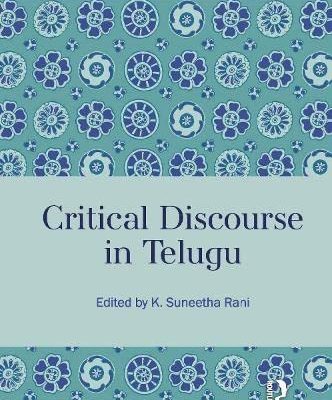Description
- ISBN-13: 9781032332680
- Publisher: Routledge (Manohar Publishers & Distributors)
- Binding: Hardcover
- No of Pages: 292
- ISBN-10: 1032332689
- Publisher Date: 01 Jan 2022
- Language: English
Original price was: ₹796.00.₹796.00Current price is: ₹796.00.
“Critical Discourse in Telugu” edited by K. Suneetha Rani (ISBN: 9781032332680) explores the dynamics of language and power in Telugu-speaking contexts. Analyze discourse within social and political frameworks to uncover hidden ideologies. Buy now to understand the critical role of language in shaping Telugu society!
1 in stock
| Weight | 0.5 kg |
|---|

Debayan Maji –
Important and timely. This book sheds light on crucial issues facing Telugu speakers today. Highly recommend!
Robin Bohat –
This book is transformative! It offers a profound and nuanced understanding of Telugu language and society.
Mohit Verma –
Excellent exploration of critical discourse. The book is insightful and thought-provoking, with many perspectives. Worth reading!
Md Kaif Alam –
It’s alright. The book is informative, but it lacks a certain spark. Nothing new, nothing fascinating.
Sanjana –
Insightful analysis of Telugu discourse! I learned a lot about the underlying ideologies at play. A must-read for language enthusiasts.
Abhinav Pandey –
It’s okay. Some chapters were engaging, while others were quite boring. A mixed bag overall.
Prajjwal Sahu –
Not bad, but not great either. It had some interesting points, but nothing that really blew me away.
Harsh Bachhil –
Good starting point, but feels incomplete. It could benefit from further exploration of contemporary issues in Telugu discourse.
Satabdi Das –
I found some of the arguments to be repetitive and unconvincing. Overall, a disappointing read.
Renuka Sanjeev Bhure –
The book provides a solid foundation for understanding critical discourse in the Telugu context. Very insightful!
Piyush Raj –
I was hoping for more practical examples. The book is very theoretical and can be difficult to apply to real-world situations.
Abhishek Kumar Thakur –
Interesting concepts, but the book felt a bit academic. Could have been more accessible to a wider audience. Explored political frameworks.
Rudraksh Bansal –
I struggled to get through this book. The language was too technical and the arguments were not always clear.
Rishika Pandey –
The book had some interesting ideas, but the writing was not very engaging, and it needed more examples.
Arpit Tiwari –
An outstanding scholarly work that is both rigorous and insightful. An important contribution to Telugu studies.
Aniket Pandey –
An exceptional book that deserves a wide readership. It’s a must-read for anyone interested in Telugu language and culture.
Anmol Bansal –
A valuable contribution to Telugu studies. The editor has compiled a diverse range of perspectives. I enjoyed this book.
Devender Pratap Mall –
This book is a game-changer! It challenges conventional thinking and offers fresh perspectives on Telugu society.
Vishnu Prasad D –
A groundbreaking work in Telugu studies. Suneetha Rani is to be commended for this important contribution.
Mansi –
A bit dry, but contains valuable information for serious students of Telugu culture and language.
Abdul Qadir –
A comprehensive and well-researched book. It’s a bit dense, but it’s worth the effort to understand the arguments. Political analysis.
Rohit Choudhary –
A decent read, but I expected more depth on certain topics. The writing style was a bit dense at times. Explored language and power dynamics in Telugu.
Arnav Aggarwal –
Too academic for my taste. I prefer books that are more accessible and engaging for a general audience.
Akash Tripathi Tripathi –
Eye-opening! This book made me think about Telugu language and society in a whole new way. A powerful analysis.